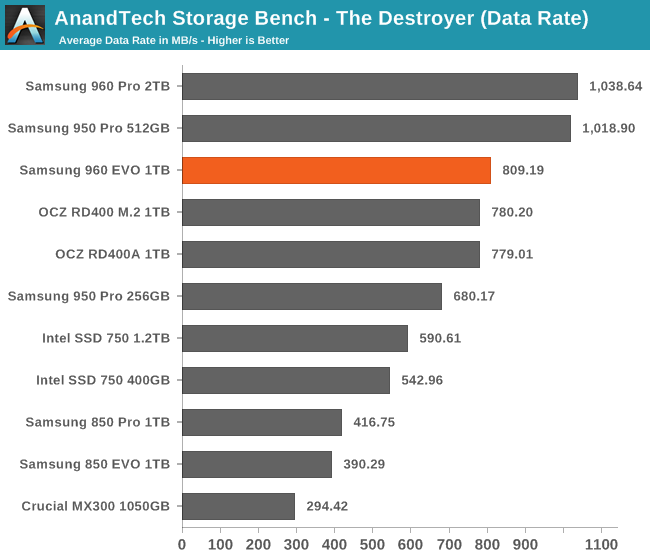Kobe Eveleigh :
I also had another question about what I think may be a myth a friend told me: Are the larger SSDs like 1TB/500GB slower due to their size?
@Elbert answered this already - but yeah - your friend is wrong on this. Actually, it's often the other way around. These a few reasons for this if you're interested. Actually writing and reading to a NAND cells (the storage that SSDs are based on) is not dramatically faster than old spinning HDDs. But one of the key reasons SSDs are so fast is that controllers have multiple channels and NAND chips, and they read/write to/from these simultaneously. So when you write to an SSD like the 850 EVO, the controller can address 8 different portions of the NAND and will split up those writes over the 8 different locations. Later read operations on that data are then similarly be "parallelised" - i.e. 8 different reads occurring simultaneously - which has an obvious performance benefit over an old HDD which has to move a single physical head over a spinning disk to read data back one block at a time. To reduce the cost of SSDs, NAND dies have gotten higher and higher density (able to store more data in a single NAND die), but that reduces the number of channels available on smaller SSDs... thus reducing performance.
Also, most SSDs devote a portion of NAND to an SLC cache - which is much faster (particularly for writes). As long as your writes are small enough to fit within the SLC cache performance is great, but exceed it, and many SSDs (particularly cheaper ones) will slow down dramatically. Larger drives often have larger SLC caches, and thus cope with more writes before performance suffers.
Finally - SSD controllers use spare area to maintain good performance under sustained writes (once the SLC cache is full). Obviously larger drives tend to have more spare area, and thus can hold up better under sustained load.
Here's an (extreme!) example:
http://www.anandtech.com/show/8747/samsung-ssd-850-evo-review/7
Look at the "Heavy Workload" and see how much faster the larger 850 EVOs are.
FYI -> That is a VERY intense workload that is NOT representative of real-world use AT ALL! So don't think you need to go out and buy the 500GB Drive because otherwise it'll be slow... the 250GB 850 EVO is great under most workloads (the "light" chart below demonstrates that). I'm just making the point that larger drives to tend to be "faster" theoretically. And 120GB drives are often noticeably slower.
Can I choose Solution and have the discussion continue or does it end thread?
Yes - feel free. A thread doesn't get closed unless a mod actively closes it, which usually only happens if it gets off track or excessively trolled. I'm happy to answer a few more questions if you have them. Others may or may not, I don't know.
I am a bit concerned about that article(seemingly) comparing also different motherboard's integrated slots, does that mean this is something that should have been factored into my motherboard choice? I bought an MSI Z-270-A Pro, hopefully the SATA 6 GB/S slots are good(do these vary between mobos)?
Intel built-in SATA controllers are fantastic and always have been. You've got an Intel board which includes the fantastic Intel SATA controllers. There's nothing to worry about here. Those add-in cards with SATA controllers onboard, as well as some higher end motherboards which provide additional SATA ports over those baked into Intel & AMD chipsets, will use 3rd party controllers from the likes of ASMedia and Marvel. As I noted, that article I linked is really old and it's entirely possible those 3rd party controllers are equally good these days. I honestly don't know. All I was trying to do is make the simple point that if you're going to pay a little more for a fast SSD, it's not a good idea to plug it into a 3rd party controller which has a significant chance of being quite a bit slower and is difficult to get reliable performance data on.
Baked in Intel (and I'd expect modern AMD) SATA controllers should be great... nothing to worry about.
Would the 960 EVO offer a significant further improvement in boot times or in-game loading times for games like Fallout 4/Skyrim over the 850 EVO?
No... real world performance metrics consistently show very little difference even between entry level and premium SSDs, let alone distinguish a solid mid range SSD (like the 850 EVO) from a high-end-but-not-premium one (like the 960 EVO).
Here's Tom's Hardware review for the premium 960 Pro - probably the best consumer SSD on the market:
http://www.tomshardware.com/reviews/samsung-960-pro-ssd-review,4774-2.html
Don't get wooed by the benchmarks... just look at the suite of charts you can click on under the headin "PCMark 8 Real-World Software Performance". There's very little difference.
Here's the 850 EVO review which reports on the same benchmarks (unfortunately the drives are not included in both review, so you have to compare):
http://www.tomshardware.com/reviews/samsung-850-evo-4tb-ssd-review,4623-3.html
There a few % difference between the 960 Pro and 850 EVO - which costs roughly half the price.
That's why the best advice from many people here on the forums says that fast storage is very rarely the best way to allocate a limited budget... and never the right choice for a gaming machine unless your budget is so large that you've basically got the best of everything else and still have money to burn.
The 850 EVO 250GB is a great purchase. It should serve you well. If you want to upgrade in future by all means start a new thread. But at this point in time, you'd likely be better served getting a large cheap SSD to fit your entire game library, than you would switching your OS to an NVMe SSD (like the 960 EVO) and battling with game shuffling or running some games off a HDD.






